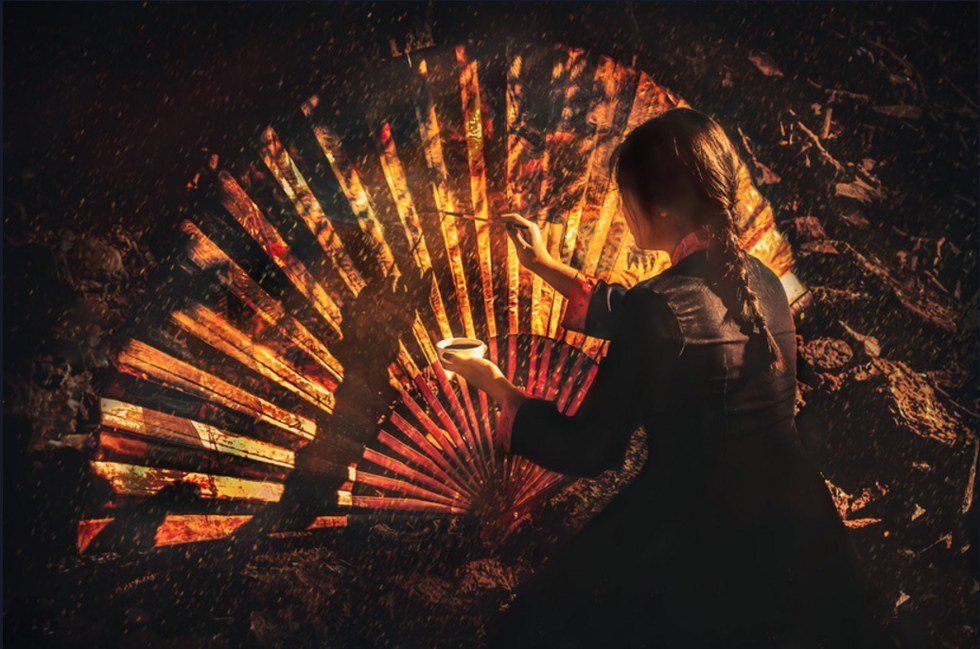We are burning zhiqian again.
My dad drags a lighter gently across the joss paper stack's edges, and flames leap to interrupt the blue-bruised twilight. The zhiqian curl, fire hungrily charring their edges, outlining dad’s face in a tapestry of blood red and ebony. My mom and I hold each other's hands as we both think of gonggong, my grandpa. We remember different things, but our pain is the same: sharp and bitter, infused with a tinge of sweetness like an amplified aftertaste of tieguanyin tea. It has been seven years, and every year, we light the zhiqian, and every year, I worry that the memories will fade. Still, as the zhiqian rustle, I know gonggong’s essence will not.
We used to worry about running out of zhiqian, but being a Chinese-American in Southern California means that a one-hour drive teleports us to Chinatown. There, zhiqian is sold in fat bundles at variety stores along with fake jian that hang so low from the ceiling, their blades skim the part in my hair. None of the jian is worth buying, though. Years of Kung Fu have taught me that the only cheap sword worth unsheathing is one I make myself. Nonetheless, even the masters, our shifu, aren't immune to the cultural love for haggling--anything is too expensive, after all, until it is free.
Shifu also tell us that meditation is the antidote to time, and as I grow as a budding Buddhist, I believe it. When I miss my gonggong, I meditate. When my heart spins, restless with a stupefying thirst to watch the ice castles in Harbin glow as I dance in layers of storm-shadowed snow jackets, my breath smearing the air in arabesque beneath stars as bright as the zhiqian fire, I meditate. Time moves ceaselessly forward, but my culture has taught me that we progress only when we stop to reflect.
A famous Chinese proverb says that a bird doesn't sing because it has an answer—it sings because it has a song. Just as meditation teaches me humility through reflections, Chinese music has taught me vulnerability through its earnestness. My erhu can unleash the wail of a river, though it is not my bow but the soul stitched into rhythms thousands of years old that makes it sing. Amidst the music, I forget to pretend to feel nothing. In the songs of my ethnic minority group, buyi, my emotions betray me again, and I’m left as breathless by the poetry of culture as I am by its ability to so utterly understand me. Not just with music, but with land. For though buyi represent only 0.02 percent of the Chinese population, our home province, Guizhou, boasts jade mountains, bamboo-studded hills, and rivers gleaming in rain-chilled sunlight like silk. The land has so little meaning on a map but so much meaning in my head. It reminds me that the tiny is mighty, the heart is huge and the human is wonderfully small.
The night we burned the zhiqian, I told gonggong my dreams. I told him about this culture that has taught me that I am not singular but plural; that I am the sunset on one side of the world and the sunrise on the other; that I am the legacy of the Tang Dynasty and the carver of the modern odyssey; that I am a child of the dragons and an awe-brimmed cosmopolitan. I told him, with eyes closed but heart opened, that my dream was to make this a world deserving of the beauty my culture has helped me see: quiet love, reflectivity and soul-deep vulnerability.
Glossary (in order of appearance, with links to the Wikipedia entry when useful):
Zhiqian: Joss paper, essentially fake money burnt as offerings/blessings to the dead
Gonggong: Maternal grandpa
Tieguanyin: A type of Chinese oolong tea
Jian: Chinese sword
Shifu: Masters, usually used in martial arts to refer to the teachers (think Kung Fu Panda--Master Oogway)
Harbin: Capital city of the Heilongjiang province in northeastern China, famous for its ice sculptures
Erhu: Chinese fiddle, a two-stringed instrument usually used to play traditional Chinese music
Buyi: One of China's 56 ethnicities, considered an ethnic minority
Guizhou: A province in southwestern China





















